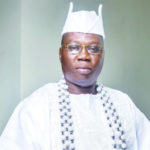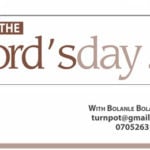
HAVING been part of the June 12 struggle, how did the decision of President Muhammadu Buharito accord recognition to the winner of the poll come to you, especially since it took half a decade for such decision to be made by the government?
I was so happy because it is a good thing to have happened, even though I believe it should have been done many years ago, especially at the time the first civilian government came to power in 1999. The government should have done the right thing as soon as it assumed power in Abuja. But, I guess because of his military background, Olusegun Obasanjo kind of took sides; if it was a complete civilian person that became president, he would have acted more appropriately and decisively. Don’t forget that President Obasanjo at the time was not even disposed to Abiola being president. So that was one of the reasons he didn’t do it. But there were other occasions that they should have done it. At least, late the President Umaru Yar’Adua came; ex-President Goodluck Jonathan came thereafter; they had the opportunities to do the needful on the issue of June 12, the winner of the election and the heroes and heroines of the costly struggle to de-annul the election.
Is it not speculative to claim Obasanjo did not accord recognition to June 12 because he was not disposed to Abiola becoming president, that there was an uncanny rivalry between them?
Well, it may sound speculative, but we know he does his things his own way; he does not care a hoot. For example, knowing how much Abiola invested in sports, he should have named the Abuja National Stadium in memory of Abiola. I don’t think anybody would have thought otherwise. Abiola was the pillar of Sports in Africa; that’s the least honour Obasanjo could have done to Abiola. You have the Yar’Adua Centre in Abuja; there are prominent streets named after eminent Nigerians.
Were Obasanjo’s hands not tied then, given the circumstances that brought him to power by a powerful clique from the North?
No, I do not think his hands were tied at all. When a person gets to power, those who put him usually lose out. He makes moves to consolidate and assert himself. They will soon discover that they can no longer control him, as he will not be ready to dance to their whims and caprices. , and Obasanjo typifies such scenario. Obasanjo is a good example in that regard. He always ends up fighting those who assist him to get to power. He even once told those benefactors that the fact they assisted him to come to power did not mean he was going to pander to their whims and caprices.
How far reaching was the recognition accorded June 12 by President Buhari, especially the heroes of the bloody struggle for the revalidation of the cancelled election results?
I don’t think the government has done enough. I believe it was something they did in a hurry. It was not pre-planned. In planning for something of this great importance and magnitude, you would have taken the pains to be meticulous and painstaking by getting all the necessary information and details; all the people that are involved as much as possible; the list of those to honoured. As a matter of fact, a lot of people are saying President Buhari should have unveiled the plan in his broadcast to the nation commemorating the third year of his administration. So, it shows that the decision to grant recognition to June 12 was an afterthought. Therefore, someone probably brought the idea and they went ahead to announce and hold the event. My take is that it is a typical Nigerian style; we don’t plan; we just do things based on the spur of the moment. So, the list is not comprehensive.
Who are some of the names on your mind?
There are names like late Senator Abraham Adesanya, Pa Solanke Onasanya and others. My father was one of the leaders of the National Democratic Coalition (NADECO). He and Chief Anthony Enahoro were the co-chairmen of the coalition. While Enahoro was abroad, my father held forte at home. I know the critical role he played in galvanising and rallying support for struggle. When I think about people talking about June 12 and they don’t mention his name, I just feel such people are being ungrateful. At that particular time, the struggle for June 12 was his life. He staked everything he had; he could not believe that someone would win an election and another person would annul it. It was something he was prepared to do all within his capacity to fight against. He went all out against it. He went to see Gen Sani Abacha in Abuja for the release of Abiola from detention. But, Abacha stubbornly refused. Even at one point, I remember that my father told us–family- that they had an appointment to see Abacha. So, my father with other leaders of the coalition. One of them was Admiral Ndubuisi Kanu (retd). But when they got to the Villa, Abacha said he could only see my father; that he was not ready to entertain the rest of the team. So, my father insisted that all members of his team must be part of the meeting. So, the issue dragged on because my father said he could not go in alone to meet with Abacha. Eventually, Abacha agreed to allow all the members of the team to come in for the meeting. There was a similar occasion. In fact, I kept pestering my dad when the whole situation became prolonged: I said: ‘why don’t you go and see the man again? He was not enthusiastic about seeing Abacha again. So, I figured that maybe, his first experience was not good. That was the kind of situation that prevailed that time. At that time, it was like people were afraid to come close and associate with members of the Ajasin family, especially we the children. They were afraid to associate with us, his children because people felt that government could come after them because of the principled stand of my dad on June 12. A cousin could not interact with me because could be a subject of attack and suspicion. Or that they might hurt because of suspicion. Don’t forget that we were just lucky; God was with us because they killed Toyin, the son of late Dr Olu Onagoruwa. They killed another prominent son of Owo in Lagos at the airport. So many things because of my dad. They deprived Owo so many things because of the role of my dad during the June 12 struggle. There was a time my dad was holding a meeting with others involved in the struggle in Owo; they were arrested and taken to the police station in Owo and detained. When the police said they would release my father alone, ostensibly because of his old age and condition, he bluntly refused and insisted that everybody must be set free unconditionally. He stuck to his gun; he said nobody could intimidate him.
ALSO READ: Fayose preaches peace, justice during Sallah
Can you recall any moment he specifically said his life was threatened because of the June 12 struggle?
I remember the then administrator of Ondo State, the late Lt. Col Anthony Onyerugbulem episode; when he came banging the door of my father’s bedroom while he was on the sickbed. It was a terrible experience; the situation degenerated into a prolonged hot argument between them. That encounter aggravated the bad health of my father as he fumed and fumed, that the military administrator invaded his bedroom and engaged him in a needless altercation for leading the June 12 struggle. All of us became apprehensive and panicky because of the negative effect of the unwarranted encounter on his health. That was the thing that finally got to him and he never fully recovered after that.
What efforts did your family made to prevail on your dad to dump the struggle because of his age, coupled with the agonizing pains his activist role was bringing upon the entire Ajasin family?
We didn’t make any effort in that regard. None, I was only concerned about his health; but he said his health was okay and that the worse the government and its security operatives could do was to kill him because of his principled belief and aversion for injustice in any form and against anybody regardless of race, creed, religion or political inclination. I didn’t want to lose him, but I knew he was fighting a just cause. I wholeheartedly supported him because it was something that also affected me in all ramifications.
Would you say the recognition for Abiola meant the issue had been justifiably settled?
I do not think so because one of the things we have been fighting for is that the winner of the election should be recognised as a president-elect because he won but he didn’t get sworn in as president of the country. But he won an election and to that extent, I think he should be recognised as president. This will go a long way in consolidating June 12 as Democracy Day as proclaimed by the government. Besides, the government must acknowledge, recognise and honour all those who actively led that struggle, including those whose identities have not been in the public domain but were known to have made enormous sacrifices to protest the gross injustice. The government should erected a monument in memory of all those that lost their lives as martyrs and heroines to further engender patriotism.





